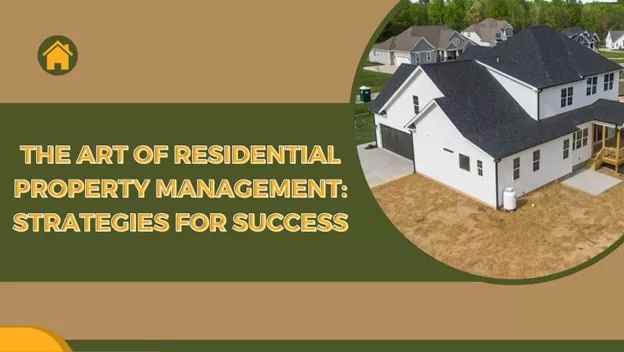When it comes to managing residential properties, there’s an art to it. Effective residential property management is crucial for property owners and tenants alike. In this article, we will explore the critical marketing strategies for success in residential property management and provide valuable insights to help you excel in this field.

What is Residential Property Management?
Residential property management involves overseeing and maintaining residential properties on behalf of property owners. As a residential property manager, your responsibilities are diverse and multifaceted.
One of the key responsibilities is maintaining clear and open communication with property owners and tenants. Building solid relationships and addressing concerns is essential for a smooth property management experience.
Essential Strategies for Success in Residential Property Management
Property Marketing and Tenant Acquisition
To attract quality tenants, conducting thorough market research and analysis is crucial. Understanding the local rental market trends and demand will help you set competitive rental rates and target the right audience.
Developing a comprehensive marketing plan is equally important. Utilize channels such as online listings, social media, and local advertisements to maximize exposure for your rental properties. Additionally, implementing effective tenant screening processes will help you select reliable tenants who will maintain the property well and pay rent on time.
Lease and Rental Management
When it comes to residential property management, creating transparent and legally compliant lease agreements is paramount. Ensure all lease terms and conditions are transparent, fair, and compliant with local rental laws. Both the landlord and the tenant are safeguarded.
Managing rental rates and rent collection is another crucial aspect of residential property management. Regularly evaluate the rental rates based on market conditions and property value. Consistent and timely rent collection ensures the financial stability of the property.
Read also :
Additionally, dealing with lease violations and evictions requires tact and adherence to legal procedures. Familiarize yourself with the eviction laws in your area and handle these situations with professionalism and empathy. As part of effective residential property management, it is crucial to prioritize the well-being of both the tenant and the property owner.
Property Maintenance and Upkeep
Maintaining the property’s condition is vital for tenant satisfaction and long-term property value. Establish preventative maintenance procedures to identify and address potential issues before they become major problems. Regular inspections and maintenance tasks will help preserve the property’s integrity.
When tenants report repair requests, respond promptly and arrange for necessary repairs. Managing vendor relationships and maintenance budgets will ensure that repairs are carried out professionally and within the allocated budget.
Tenant Relations and Customer Service
Establishing positive relationships with tenants is crucial for a harmonious living environment. Be approachable, responsive, and respectful in your interactions. Address tenant concerns promptly and provide excellent customer service.
Additionally, develop tenant retention strategies to encourage long-term tenancy. Regular communication, periodic property inspections, and incentives for renewing leases can foster a sense of loyalty and reduce tenant turnover.
Financial Management and Reporting
Implementing effective accounting systems is essential for accurate financial management. Maintained meticulous records of income and expenses, ensuring proper documentation of all financial transactions.
Create budgets and financial plans to manage property expenses efficiently. It includes accounting for maintenance costs, property taxes, insurance, and other relevant expenses. Prepare accurate financial reports for property owners and stakeholders regularly to provide transparency and insight into the property’s economic performance.
Tools and Technologies for Efficient Property Management
Utilizing property management software and platforms can streamline your operations. These tools offer features such as online rent collection, maintenance ticket tracking, and financial reporting, making your job easier and more efficient.
Leveraging online listing and advertising platforms will help you reach a wider audience when marketing your properties. Platforms like Zillow, Craigslist, and social media sites can attract potential tenants and simplify the application process.
Communication and collaboration tools are also essential for efficient property management. Utilize communication tools such as email, phone, and messaging apps to stay in touch with property owners and tenants. Additionally, consider implementing collaboration tools like project management software or shared document platforms to streamline tasks and ensure everyone is on the same page.
Legal Considerations in Residential Property Management
To navigate the legal landscape of residential property management successfully, being familiar with local and national rental property laws is crucial. Stay updated on regulations related to lease agreements, tenant rights, eviction procedures, and property maintenance obligations.
Understanding fair housing regulations is also essential. It ensures that all tenants are treated fairly and protected against discrimination based on race, religion, gender, or disability. Adhere to fair housing laws in all your interactions and decisions.
Maintaining proper documentation and records is critical to protecting the property owner and yourself. Keep records of lease agreements, repair requests, rent payments, and other relevant documents. These records serve as evidence and help in disputes or legal issues.
Professional Development and Industry Resources
Investing in continuing education and certifications is important to excel in residential property management. Keep abreast of business trends, recommended procedures, and legislative changes.
Various organizations offer certifications and courses specifically tailored for property managers. Utilize these resources to broaden your knowledge and abilities.
Industry associations and networking opportunities can provide valuable insights and connections. Join local or national property management associations to connect with peers, attend conferences, and participate in educational events. Networking with other professionals in the field can offer fresh perspectives and support.
Accessing online resources and educational materials is another way to expand your knowledge. Websites, blogs, and forums dedicated to property management provide information, tips, and advice. Stay curious and use these resources to stay ahead in the industry.
Challenges and Tips for Overcoming Them
Residential property management comes with its fair share of challenges. Dealing with difficult tenants and conflicts requires patience and practical communication skills. Address issues promptly and professionally, always striving for resolution and maintaining a professional demeanor.
Effective time management and prioritization are essential to handling the numerous tasks involved in property management. Create a schedule, prioritize tasks, and delegate when possible to maximize productivity.
Lastly, staying updated with industry trends and best practices is crucial. Attend seminars, webinars, and conferences to stay informed about the latest developments. Subscribe to industry publications and follow reputable sources online to stay in the loop.
Final Thought
Residential property management is an art that requires a combination of skills, marketing strategies, and continuous learning. You can succeed in this field by implementing the strategies discussed in this article, such as effective communication, marketing, maintenance, and financial management.
Remember, successful property management is not just about managing properties; it’s about building relationships, providing excellent customer service, and adapting to the ever-changing industry.
Embrace the art of residential property management, and you’ll be well on your way to becoming a skilled and prosperous property manager.









